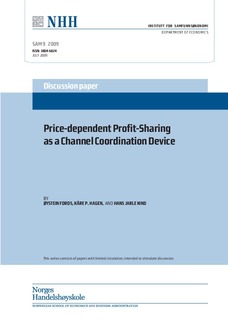| dc.contributor.author | Foros, Øystein | |
| dc.contributor.author | Hagen, Kåre Petter | |
| dc.contributor.author | Kind, Hans Jarle | |
| dc.date.accessioned | 2009-09-22T08:02:58Z | |
| dc.date.available | 2009-09-22T08:02:58Z | |
| dc.date.issued | 2009-07 | |
| dc.identifier.issn | 0804-6824 | |
| dc.identifier.uri | http://hdl.handle.net/11250/163242 | |
| dc.description.abstract | We show how an upstream firm by using a price-dependent profit-sharing rule can prevent destructive competition between downstream firms that produce relatively close substitutes. With this rule the upstream firm induces the retailers to behave as if demand has become less price elastic. As a result, competing
downstream firms will maximize aggregate total channel profit. When downstream
firms are better informed about demand conditions than the upstream firm, the
same outcome cannot be achieved by vertical restraints such as resale price maintenance (RPM). Price-dependent profit-sharing may also ensure that the downstream
firms undertake efficient market expanding investments. The model is consistent
with observations from the market for content commodities distributed by mobile
networks. | en |
| dc.language.iso | eng | en |
| dc.publisher | Norwegian School of Economics and Business Administration. Department of Economics | en |
| dc.relation.ispartofseries | Discussion paper | en |
| dc.relation.ispartofseries | 2009:9 | en |
| dc.subject | profit-sharing | en |
| dc.subject | vertical restraints | en |
| dc.subject | investments | en |
| dc.title | Price-dependent profit-sharing as a channel coordination device | en |
| dc.type | Working paper | en |
| dc.subject.nsi | VDP::Samfunnsvitenskap: 200::Økonomi: 210::Samfunnsøkonomi: 212 | en |
| dc.subject.nsi | VDP::Samfunnsvitenskap: 200::Økonomi: 210::Bedriftsøkonomi: 213 | en |
